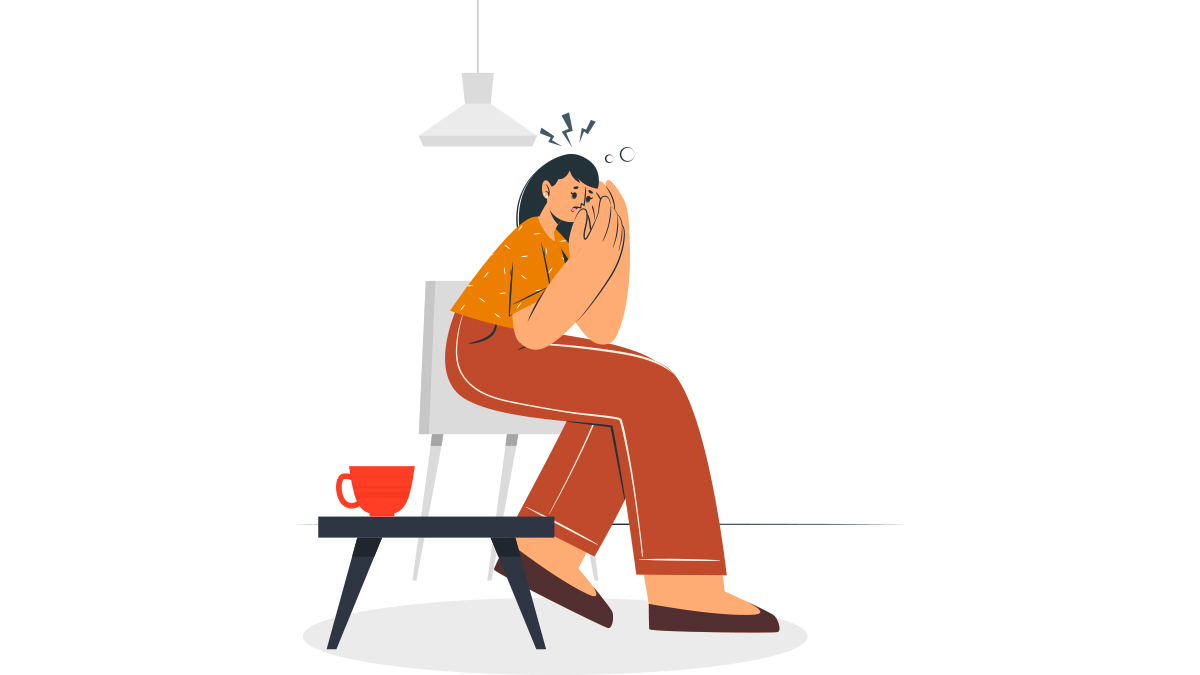
Many of us are facing challenges that can be stressful, overwhelming, and cause strong emotions in adults and children. Public health actions, such as physical distancing, can make us feel isolated and lonely and can increase stress and anxiety.
After a traumatic event, people may have strong and lingering reactions. Learning healthy ways to cope and getting the right care and support can help reduce stressful feelings and symptoms.
Research has indicated that the percentage of Americans who are stressed at work is high—and it’s only getting higher. According to a survey of more than 2,000 full-time U.S. employees, ages 18-79, more than half of employees find themselves stressed during at least 60%t of the workweek.
What are the Symptoms of Work-Related Stress?
Work-related stress may manifest as physical, psychological, or behavioural symptoms.
Psychological Symptoms
Psychological symptoms of stress may include the following –
- Fears
- Depression
- Discouragement
- Irritability
- Being pessimistic
- Feeling exhausted and incapable of confronting
- Intellectual issues, such as impaired focus or decision-making capacity.
Physical Symptoms
Stress can have physical symptoms like the ones mentioned below –
- Tiredness
- Tension of muscles
- Headaches
- Palpitations of the heart
- Sleeping problems, such as insomnia
- Diarrhoea or constipation, gastrointestinal disturbances
- Dermatological disturbances.
Behavioral Symptoms
Stress can be observed in behaviours as well. For example –
- Increased illness or absenteeism
- Aggression
- Reduced creativeness and effort
- A decrease in results
- Interpersonal problems
- Irritability and mood swings
- Anger issues and impatience
- Isolation and disinterest
10 possible sources of stress at work

Workplace stress can happen for a variety of reasons, including:
1. Poor relationships at work
Poor workplace relationships can leave employees feeling isolated.
Conflict with co-workers can leave employees feeling anxious and avoidant about coming to work.
A non-inclusive ‘cliquey’ environment can also be a source of stress. Employees not included in social groups at work will weaken employee relations. This prevents team members from building a sense of belonging and feeling valued.
2. Lack of support
A lack of support, training and direction from managers can lead to confusion at work. Uncertainty around employee responsibilities and duties can be a source of frustration.
3. Long hours and heavy workloads
Many jobs have placed growing pressure on employees to work longer and harder. Companies expect their employees to complete massive volumes of work in a short amount of time.
These high expectations and heavy workloads can contribute to significant employee strain.
4. Changes within the organization
Structural changes can be stressful at the best of times. But they cause even more strain when they’re not properly planned and implemented.
5. Poor working environment
Workspaces in which bullying and harassment take place are hot targets for stressed-out workers. Team members in these environments may feel as though their input isn’t valued. Feeling like they have no control over how they’re treated at work can be a stressor.
6. Job insecurity
Today’s economy is highly competitive and volatile. This is especially true in light of the economic effects of the COVID-19 pandemic.
These factors drive companies to lay off employees, creating job insecurity. Increased workloads for their remaining workers add further strain.
7. Lack of autonomy
Employees given excessive responsibility without the ability to properly delegate may become demotivated and despondent. They have no decision-making power in their roles.
8. Workplace discrimination
Racial, gender and disability discrimination has long been pervasive problems in the workplace. These issues cause significant stress to those experiencing them first-hand.
9. Outdated tools and technologies
Working with clunky, outdated technology can be stressful. Employees may struggle to be productive without functional tools at their disposal.
10. Unclear expectations from management
Vague instructions and expectations from managers can quickly lead to conflict at work. This places undue stress on all parties involved.
How to Monitor Stress Management in the Workplace?
It is up to the employers to ensure the employees’ health and safety at work. Managers should be proactive in this regard. They should be concerned about distress in the workplace since it can significantly impact their bottom line.
Employers should look at the following to get an idea about how their employees are coping with stress
- Change in routine behaviour of workers – such as irritable, withdrawn or unpredictable behaviour.
- Unable or unwilling to engage with others.
- Failure to concentrate on work.
- Absenteeism.
Increases the likelihood of actions to address symptoms and root triggers through identifying stress signs at an early level, minimizing the danger to people’s well-being, safety and consequences to the department.
9 Simple Ways to Deal With Stress at Work

Work stress can have major health effects that vary from relatively mild (like having headaches) to something potentially dangerous (such as heart disease and metabolic syndrome).
Though some degree of work stress is normal, it is difficult to find a low-stress job (if not impossible). A successful strategy to stress management in the workplace is a more practical solution. You can try any stress management strategies if you find it challenging to deal with stress.
Here is a list of 10 possible ways to proceed. You may choose one or two things that make the most sense to you and make them part of your everyday life to help you create healthier routines and support your mind.
Start Your Day off Right
After scrambling to get the kids fed and off to school, dodging traffic and combating road rage, and gulping down coffee in lieu of a healthy breakfast, many people arrive to work already stressed. This makes them more reactive to stress in the workplace.
You might be surprised by how affected by workplace stress you are when you have a stressful morning. When you start off the day with planning, good nutrition, and a positive attitude, you might find that the stress of your job rolls off your back more easily.
Be Clear on Requirements
A factor known to contribute to job burnout is unclear requirements for employees. If you don’t know exactly what is expected of you, or if the requirements for your role keep changing with little notice, you might become extremely stressed.
If you find yourself never knowing if what you are doing is enough, it may help to have a talk with your supervisor. You can take the time to go over expectations and discuss strategies for meeting them. This can relieve stress for both of you!
Stay Away From Conflict
Interpersonal conflict takes a toll on your physical and emotional health. Conflict among co-workers can be difficult to escape, so it’s a good idea to avoid conflict at work as much as you can.
Don’t gossip, don’t share too many of your personal opinions about religion and politics, and steer clear of “colorful” office humor.
When possible, try to avoid people who don’t work well with others. If conflict finds you anyway, make sure you know how to handle it appropriately.
Stay Organized
Even if you’re a naturally disorganized person, planning ahead to stay organized can greatly decrease your stress at work. Being organized with your time means less rushing in the morning to avoid being late as well as less hustling to get out at the end of the day.
Keeping yourself organized can also mean avoiding the negative effects of clutter, and being more efficient with your work.
Be Comfortable
Another surprising stressor at work is physical discomfort, often related to where you perform most of your daily tasks (such as at your desk).
You might not notice you’re stressed if you’re sitting in an uncomfortable chair for just a few minutes, but if you practically live in that chair when you’re at work, you might have a sore back and be more reactive to stress because of it.
Even small things like office noise can be distracting and cause feelings of low-grade frustration. Do what you can to create a quiet, comfortable, and soothing workspace.
Forget Multitasking
Multitasking was once heralded as a fantastic way to maximize one’s time and get more done in a day. However, people eventually began to realize that if they had a phone to their ear and were making calculations at the same time, their speed and accuracy (not to mention sanity) often suffered.
There is a certain “frazzled” feeling that comes from splitting your focus and it doesn’t work well for most people. Instead of multitasking to stay on top of your tasks, try another cognitive strategy like chunking.
Walk at Lunch
Many people feel the ill effects of leading a sedentary lifestyle. You can combat the physical and mental effects of work stress by getting some exercise on your lunch break.
If your schedule allows for it, you might try taking short exercise breaks throughout the day. This can help you blow off steam, lift your mood, and get into better shape.
Keep Perfectionism in Check
Being a high achiever might make you feel good about yourself and help you excel at work, but being a perfectionist can create problems for you (and those around you).
You might not be able to do everything perfectly, every time—especially in a busy, fast-paced job. A good strategy to avoid the perfectionism trap is always striving to just do your best and making time to congratulate yourself on your efforts. You may find that your results are better and you’ll be much less stressed at work.
Listen to Music on the Drive Home
Listening to music offers many benefits and can be an effective way to relieve stress before, during, and after work. Playing an uplifting song while you make breakfast can help you start the day off feeling better prepared to interact with the people in your life. Likewise, combating the stress of a long day with your favorite music on the drive home can help you wind down and feel less stressed when you get there.
Conclusion
In today’s rapidly changing world, more people than not are experiencing high levels of workplace stress.
It’s crucial for every one of us to learn how to cope with bad stress and embrace good stress.
Learning how to manage stress at the workplace can help you identify your stress triggers. It also ensures you have the right tools to protect your mental and physical well-being for years — even while you are under pressure.






Follow Us On